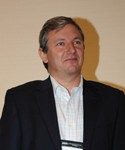 Throughout Eric Calais’s career studying active deformation at plate boundaries and interiors, Eric Calais always had a focus on key questions for hazard assessment, particularly in northeastern Caribbean, one of his longtime study areas. When a devastating earthquake struck Haiti in January 2010, Calais was among the first scientists to arrive on the ground to investigate the event. He subsequently served as the chief scientific advisor and coordinator for the United Nations, Haitian government and scientific agencies.
Throughout Eric Calais’s career studying active deformation at plate boundaries and interiors, Eric Calais always had a focus on key questions for hazard assessment, particularly in northeastern Caribbean, one of his longtime study areas. When a devastating earthquake struck Haiti in January 2010, Calais was among the first scientists to arrive on the ground to investigate the event. He subsequently served as the chief scientific advisor and coordinator for the United Nations, Haitian government and scientific agencies.
For his extraordinary leadership in earthquake safety in the reconstruction of Haiti and devotion to their people, Eric Calais received the Frank Press Public Service Award from the Seismological Society of America on April 17 at the Society’s annual meeting in San Diego.
In the early 1990s, Calais, then a doctoral student, engaged in research on active faults in the northern Caribbean. In 2001, then professor of geophysics at Purdue University, Calais established a research program aimed at determining the level of hazard posed by active faults in the northeastern Caribbean, which included fieldwork in Haiti. By 2007, his team had published slip rates for the two main plate boundary faults, providing critical information for seismic hazard assessment. As a result of this work, Calais’ team forecasted, in 2008, the potential for earthquakes similar to the event that struck Haiti in 2010.
With years of experience working in Haiti, Calais not only published scientific articles on his observations that indicated the potential for large earthquakes in Haiti, but he also worked to raise awareness among the public and national authorities and to build the scientific capacity within Haiti.
Upon his return to Haiti after the 2010 quake, Calais’ professional network, connections and expertise in the region positioned him to provide needed scientific counsel to national and international political leaders and policymakers. He served as a science adviser to the UN, stationed in Port-au-Prince, and was also recruited to serve as co-chair of the United Nations Haiti Earthquake Risk Reduction Task Force.
Calais was appointed chief editor for the prestigious journal Geophysical Research Letters in 2009 and has served as an expert consultant for the World Bank, the International Development Bank and the United Nations. He received a Ph.D. in earth sciences from the University of Nice, France, in 1991 and was a postdoctoral researcher at Scripps Institution of Oceanography from 1992 to 1995.
